Controlling garden pests doesn’t have to be frustrating or time consuming. In this post, you’ll learn all about garden insect pest control, how to prevent infestations, and quickly get rid of any bad bugs that do attack your plants.
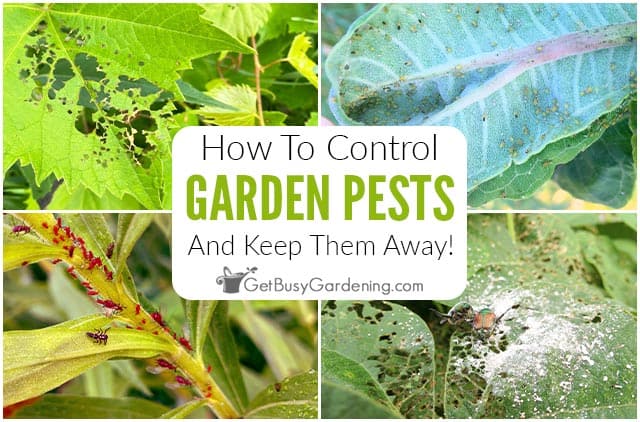
Garden pest control can become one of the most disheartening and time consuming problems that growers face. But it doesn’t have to be that way.
Not all bugs are bad! In fact, some are essential to keeping your garden healthy and thriving. Once you understand how to work with nature instead of against it, your job will become much easier.
Getting rid of garden pests shouldn’t be the main goal here. The key is to find a balance so that your plants will thrive, despite having a few insects munching on them.
In this detailed guide you will find essential tips for preventing infestations and controlling garden pests, without using chemical insecticides.
Bugs Are A Part Of Gardening
First off, for better or worse, insects are a part of gardening. I remember back when I first started, I absolutely hated ALL of the bugs! But guess what, not all bugs are bad.
Many of the ones you see, like bees, wasps, and spiders, are actually beneficial, and some will even help you with garden pest control! In fact, there are WAY more good bugs than bad ones.
Once I learned about beneficial insects, and how important they are for maintaining a healthy garden, I started to love the bugs (well, most of them anyway).
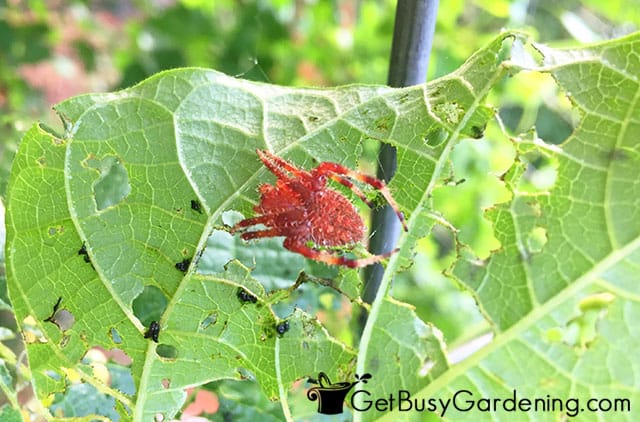
Common Types Of Garden Pests
As a gardener, it’s a good idea to become familiar with the common pests in your area, so that you know what to look for.
Garden pests come in many forms, but remember that not all types of bugs in these categories are bad. Below are some familiar ones, with a few of the most common pest insects listed in parenthesis.
- Caterpillars (like cabbage worms and hornworms)
- Worms (squash borers and iris borers, for example)
- Beetles (e.g.: Japanese beetles and flea beetles)
- Mites (spider mites are common)
- Scale insects (like mealybugs and plant scale)
- Slugs and snails
- Sap sucking bugs (e.g.: aphids and squash bugs)
Why You Should Use Organic Garden Pest Control Methods
Gardening can be tough for organic growers. Especially on those days when you walk out to enjoy your hard work, only to see your beautiful flowers or veggies covered with disgusting, ravenous bugs.
Sometimes it can be tempting to run to the store to buy a big bottle of a chemical pesticides, and just wipe those nasty things right off the face of the planet. (deep breath)
But before you pick up that bottle, consider this. Pesticides are made to kill bugs, and they don’t discriminate. They will kill the beneficials, like bees, butterflies, and predatory insects, right along with the pests.
In addition, some pest insects are resistant to synthetic pesticides, and they recover faster from chemical treatments than the beneficial bugs do.
So, essentially what we’re doing by spraying these chemicals in your garden is killing the good bugs, and helping the bad ones, creating a much worse problem for ourselves in the future.
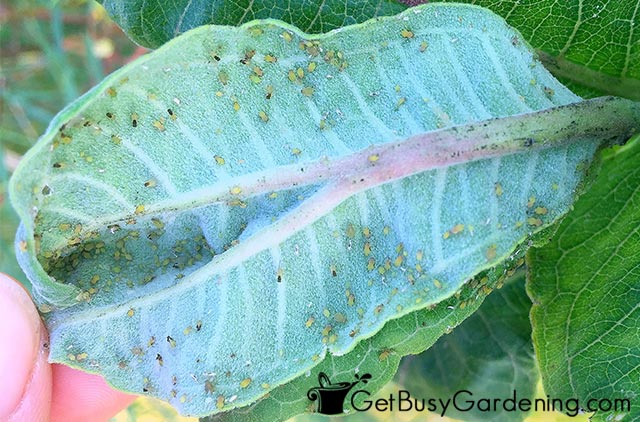
Steps For Preventing Garden Pests
There are some simple steps that you can take to prevent garden pest infestations. Don’t resort to using pesticides until after you have tried all of the methods listed here.
1. Maintain A Healthy Garden
Strong, healthy plants can handle a few bugs munching on them. So, your first step in controlling pests should always be to focus on maintaining a healthy garden.
Well balanced gardens attract beneficial predators. Which means that most of the time you can leave the bad bugs alone, and allow nature to take its course.
When you nourish your plants and the soil, and embrace the delicate balance between pests and prey, you’ll have a much easier job.
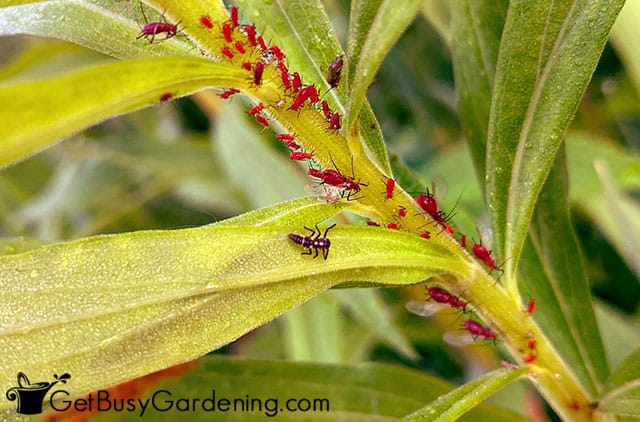
2. Monitor Your Garden For Pests
An important part of maintaining a healthy garden is simply observing it. Stroll through it on a regular basis, and observe your plants. As you walk around, pay attention to signs of possible infestations.
Some common signs to watch out for are yellow, curled, or drooping leaves, holes in the foliage, leaves dropping off, or several bugs clustered on a plant.
If you see any of these warning signs, take a closer look to determine if there’s a pest infestation. Be sure to look under the leaves too.
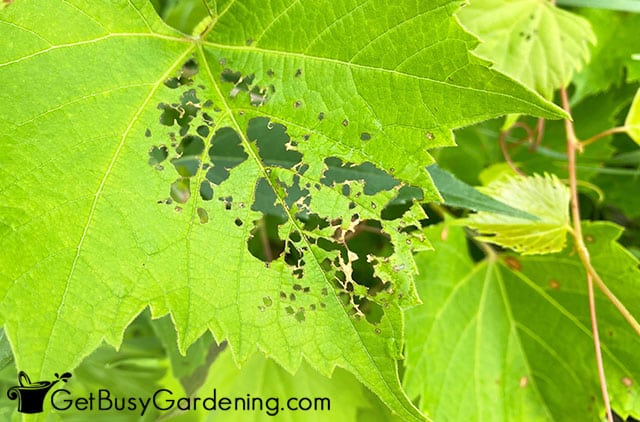
3. Know Your Enemy
Before treating any garden pest infestation, make sure you know the insect that you’re dealing with. If you can’t find it online, put some into a clear, sealed baggie, and bring it to your local garden center for a positive ID.
Just because you find a caterpillar eating a leaf doesn’t mean it’s a bad bug. It could be monarch or swallowtail butterfly larvae snacking on their favorite host plant.
Before you decide whether or not to get rid of it, find out what it is first. You might just choose to leave it be, and plant some extra food for it next year.
Plus, when the bad bugs do show up, it’s important to know your enemy so you can get rid of them quickly and efficiently.
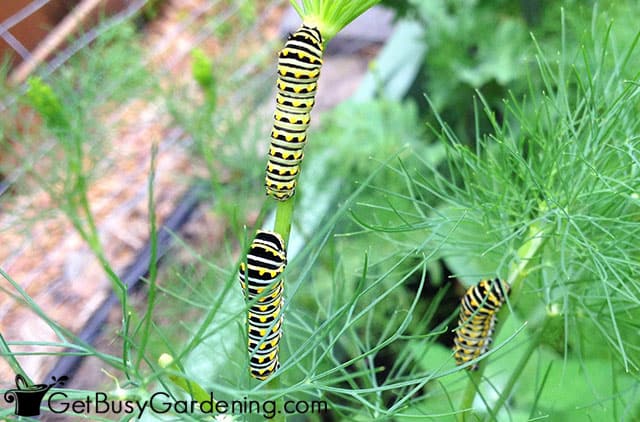
How To Control Garden Pests Naturally
There are several ways to kill insect pests naturally, without using harmful chemicals. Many destructive garden bugs can easily be controlled by using physical methods.
Hand picking, adding row covers, or simply knocking the pests off of the plant with a strong spray of water from the garden hose are all effective methods.
You can learn all of my natural control remedies here, but below are some general tips to follow…
Biological Garden Pest Control Methods
As I mentioned above, many types of insects are natural predators that will get rid of the pests for you. So, enlist their help by encouraging them to come to your garden.
Plant annual flowers with your vegetables and perennials to attract predatory bugs. Marigolds, sunflowers, and zinnias are good choices.
Birds are also voracious predators that feed on pest insects. Invite them into your yard by installing bird baths, feeders, and bird houses.
You can also increase the population of natural predators (like ladybugs or beneficial nematodes) by purchasing them, and releasing them in your yard. Check with your local garden center to see if they sell them.
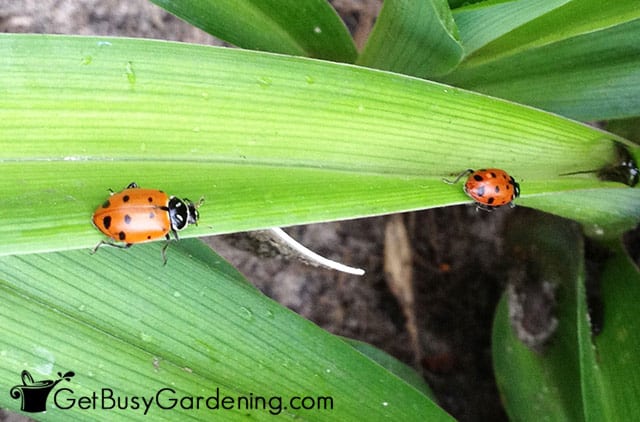
Use Organic Pesticides
If you are at your wits’ end, and using a pesticide is your last option, then look for natural and organic products that will kill only the pest insect.
It’s important to use all of these products, even organic ones, with extreme caution. You don’t want to end up killing the good bugs in the process of trying to get rid of garden pests.
So, never do any type of broad application of any pesticides. Use them to target the pest insect only. Here are some of my favorite natural products for controlling garden pests…
- Organic insecticidal soap
- Homemade soap spray (mix 1 tsp mild liquid soap to 1 liter of water)
- Diatomaceous earth (DE)
- Neem oil
- Horticultural oil
- Hot pepper spray
Garden Pest Control FAQs
In this section, I’ll answer some of the most frequently asked questions about controlling garden pests. If you can’t find an answer here, ask your question in the comments section below.
What can I spray on my garden to keep bugs away?
I do not recommend spraying anything on your entire garden to keep pests away. If they are eating a certain plant, then use organic treatment methods to keep them away from that specific plant only.
But never do any kind of broad spraying of pesticides (organic or not) in your garden, or you could end up killing beneficial bugs in the process.
What plants are good for pest control?
There are lots of different types of plants that work to either deter pest insects, or attract predatory bugs to help with garden pest control.
Herbs, and other smelly plants like onions and garlic are great deterrents, and native flowers are fantastic for attracting beneficials.
Controlling garden pests is an ongoing process, and complete elimination of all of the destructive bugs is not a realistic goal. You can, however, fight pest insects naturally without resorting to chemical insecticides by consistently practicing the steps listed above.
Recommended Books
- The Organic Gardener’s Handbook of Natural Pest Control
- Bug-Free Organic Gardening
- Good Garden Bugs: Everything You Need to Know about Beneficial Predatory Insects
- The Vegetable Garden Pest Handbook
More About Garden Pest Control
- How To Make A Homemade DIY Fruit Fly Trap
- All About Ladybugs & Why They’re Good For Your Garden
- 85+ Deer Resistant Plants For Your Garden
- How To Use Japanese Beetle Traps
- Grapevine Beetle Information & Organic Control Tips
- How To Protect Grapes From Birds & Insects
- Facts About Ants In A Garden & Organic Control Tips
Share your tips for controlling garden pests in the comments section below!
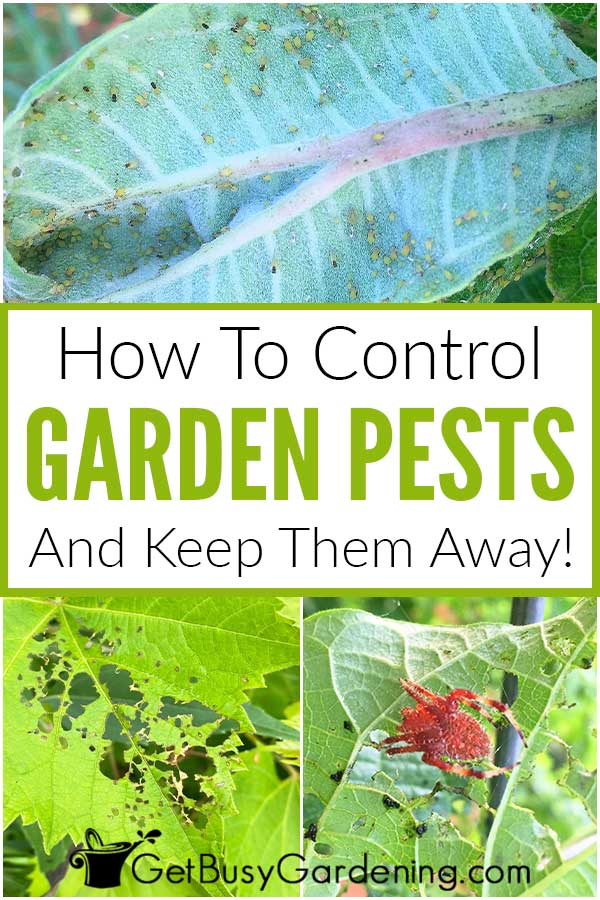
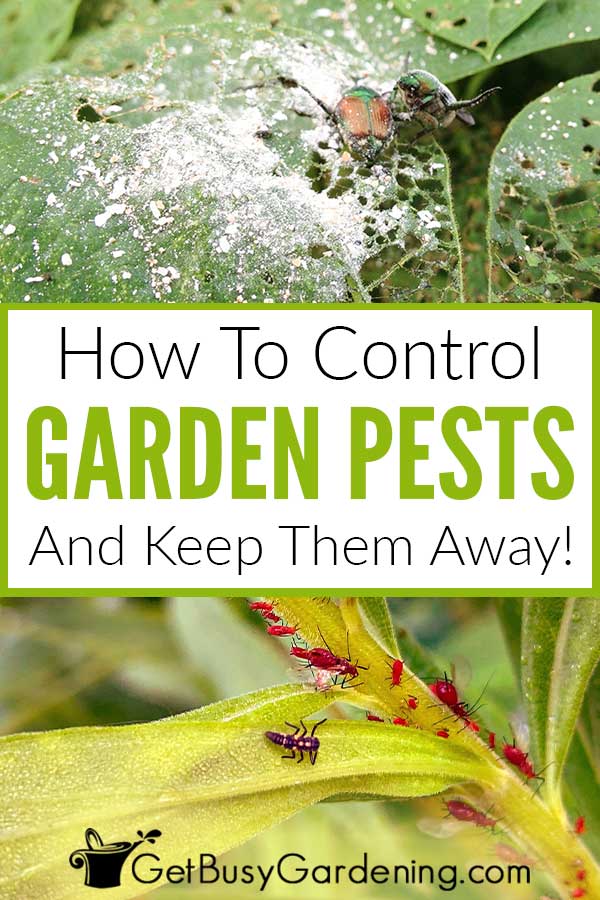
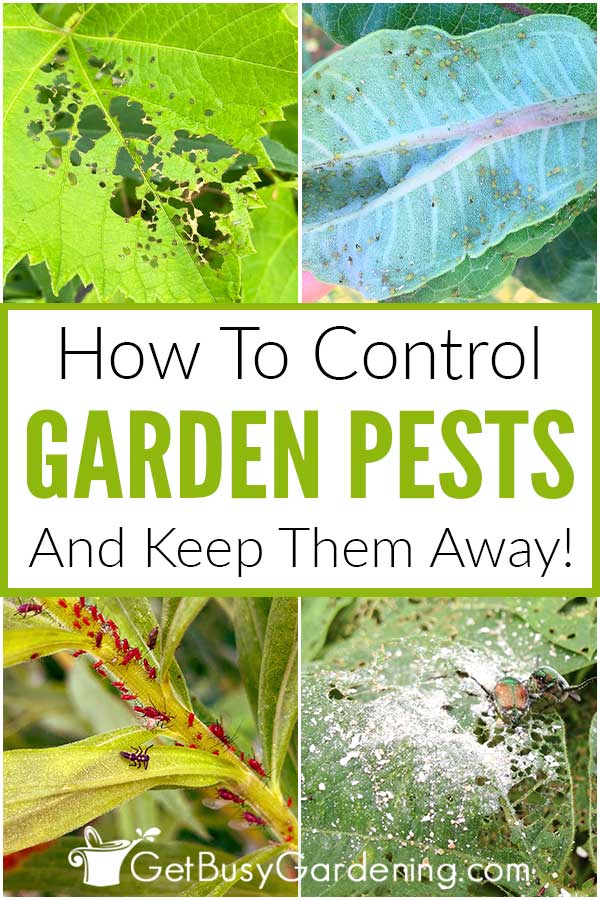

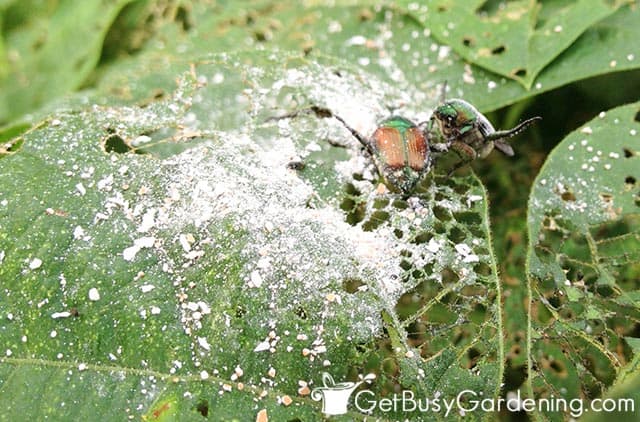

Sharon says
How about grasshoppers? We have so many it’s called grasshopper hill. It is a yearly problem not to be ever gotten rid of. Help?
Amy Andrychowicz says
Ugh, that sounds very frustrating! With an infestation that bad, you’re definitely going to have to take a multi-level approach and use several methods (and have lots of patience). I would definitely try using physical barriers like row covers when the grasshoppers are really bad. That should help to protect the plants they like the best. Other methods like regular hand picking, introducing predatory insects (like lacewings, beneficial nematodes, ladybugs, etc), attracting frogs and birds to your beds, and spraying natural repellents will also help, though some will take time to work. The key to any bug infestation is to stay consistent, be persistent, and always maintain a healthy and chemical-free garden where natural predators can thrive, and mother nature can help you out. Good luck!
Jenny says
I know a great natural pesticide recipe that doesn't kill bugs so much as just ward them off, they don't like the smell or something.
Chop marigold leaves and mix in a bucket with a few garlic bulbs (chopped) and some crushed chillies. Add a sprinkle of baking powder and wood ash, and a small chunk of soap, mix it up, cover with water and then add a lid and leave for 4 days.
Amy Andrychowicz says
Great, thanks for sharing your garden pest repellant recipe. I will have to give it a try!
Billie Jo says
Your cauliflower leaves look my cabbage leaves! Same culprit, I'd guess?
Amy Andrychowicz says
Yes, most likely. That damage is caused by cabbage worms, a very common garden pest on all types of brassica plants. Look under the leaves, that’s where the buggers like to hide. They are green caterpillars. Easy to pick off and drop into a bucket of water, or squish them. Here’s more details… How To Get Rid Of Cabbage Worms Organically.